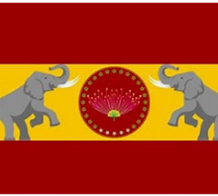- within Intellectual Property topic(s)
- in India
- with readers working within the Basic Industries industries
- within Intellectual Property, Employment and HR, Litigation and Mediation & Arbitration topic(s)
G.B. Pachaiyappan and others, as plaintiffs, approached the Madras High Court against Tamilaga Vettri Kazhagam and others, the defendants, alleging trademark infringement, copyright violation, and passing off, among other claims. Alongside the main suit, the plaintiffs also moved for interim relief by way of an injunction. This article examines the arguments presented by both parties and the findings of the Court.
Plaintiffs' contentions
The plaintiffs argued that:
- The first plaintiff is the founder of the second plaintiff trust, which was established in August 2023 to provide educational and social welfare services to the public.
- The plaintiffs adopted a flag
 as their mark, with usage commencing prior to
the formation of the trust.
as their mark, with usage commencing prior to
the formation of the trust. - The mark is registered in Class 45, covering social and informational services.
- Being an original creation, the flag qualifies as an artistic work under Section 2(c) of the Copyright Act.
- The first defendant is a political party, and the second defendant is its president.
- The defendants allegedly copied the plaintiffs' flag in adopting it for the political party, replicated the colour combination in a different style, and adopted the same colour scheme for scarves worn by the party's leaders and workers.
- As prior users of the mark, the plaintiffs are entitled to relief both under statute and common law.
Defendants' Counter arguments
- Neither the plaintiffs nor the defendants are engaged in trade. Under Section 2(1)(zb) of the Trademarks Act, 1999, a "connection in the course of trade" is necessary to claim trademark proprietorship, which the plaintiffs lack.
- A comparison of the flags shows material differences. The
defendants' flag
 features maroon
bands at the top and bottom, a yellow section with two dancing
elephants, and an oval device with a Vaagai flower encircled by
stars.
features maroon
bands at the top and bottom, a yellow section with two dancing
elephants, and an oval device with a Vaagai flower encircled by
stars. - The plaintiffs have not demonstrated goodwill or reputation, and given the divergent nature of their activities, there is no likelihood of confusion. Consequently, the injunction application should be dismissed.
Court's Analysis and Findings
Copyright Infringement
The Court noted that copyright infringement does not require the works to be identical; substantial copying is sufficient, and minor variations cannot shield infringement. Both flags share a red/maroon–yellow–red/maroon colour scheme and feature central devices.
- Plaintiffs' Flag: A circle containing a fish, a leaping tiger, a bow and arrow at the top, and word elements beneath the fish and tiger.
- Defendants' Flag: An oval device with elephants in the yellow segment.
On prima facie comparison, the Court found that the defendants' flag is not a substantial copy of the plaintiffs' flag. Consequently, the copyright infringement claim was rejected.
Trademark Infringement
The Court observed that both marks are composite in nature. Importantly, the plaintiffs did not have separate registration for the colour combination, so protection is limited to the composite mark. Even when assessed from the perspective of an average person potentially availing of the plaintiffs' services, the use of the defendants' flag is unlikely to cause deception or confusion.
Passing Off
Considering that the plaintiff trust was formed only in August 2023, the mark was registered on a "proposed-to-be-used" basis, and donations received were modest, the plaintiffs failed to establish goodwill or reputation. Consequently, the Court held that the requirements for passing off were not satisfied.
In light of the above the Court dismissed the injunction application filed by the plaintiffs.
Appeal before the Division Bench
Aggrieved by the Single Judge's decision, the plaintiffs have approached the Division Bench in appeal. The Court has served notice on the parties in the appeal, and the proceedings are ongoing before the Madras High Court.
The content of this article is intended to provide a general guide to the subject matter. Specialist advice should be sought about your specific circumstances.


